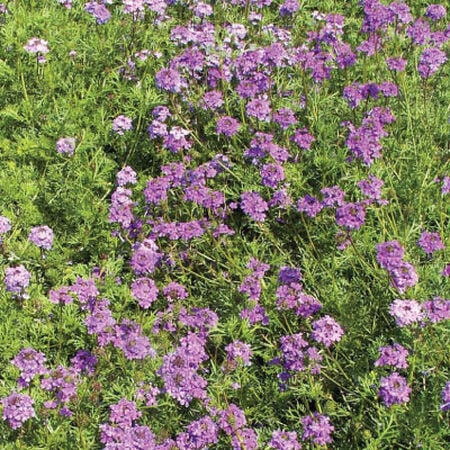Purple Moss, Verbena Seeds
Key Attributes
Key Attributes
Product Details
Weight
0.008Depth
0.1Height
4.5Width
3.25Plant Height
8-12"Botanical Name
Verbena TenuisectaSeed Type
SeedAdditional Characteristics
Ground CoverSeeds Per Gram
988Seeds Per Pound
448,000Packet
500 SeedsSow Depth
1/8"Seeds Per Ounce
28,000Breed
Open-pollinatedSun
Full SunGrowing Conditions
Container Friendly, Hanging BasketsLife Cycle
AnnualSow Method
TransplantCategories
FlowersDays To Maturity (# Days)
80Components
Growing Instructions
![]() Learning Download: How to Grow Verbena
Learning Download: How to Grow Verbena
Verbena also is known as Vervain, and it is a very popular plant among gardeners because of their unique clusters of blooms and the flower is easy to care for. These flowers are oftentimes planted in rock gardens, in hanging baskets, as a groundcover and in patio containers.
Before Planting: Sow verbena seeds indoors 10 to 12 weeks before transplanting them outside. Verbena seedlings are prone to cold sensitivity, so be sure to plant them at the right time so the seeds have the best chance at survival.
Planting: If you want to sow them directly into the garden, plant them in either a cold frame or a raised bed and don’t do so until the spring.
Watering: Plan on watering the Verbena at least one inch a week to encourage the best growth and blooms.
Fertilizer: Fertilize the Verbena lightly with a 16-4-8 fertilizer in the mid-spring, and you can also use this same fertilizing method right after you cut the Verbena back.
Days to Maturity: The flowers will begin to bloom in late spring to early summer.
Harvesting: You can use Verbena as cut flowers to display in bouquets.
Tips: Trim the Verbena lightly in the fall, but do not cut them back very far, or else the flowers may not return after the winter.
Shipping Schedule
Our Seed Promise
 "Agriculture and seeds" provide the basis upon which our lives depend. We must protect this foundation as a safe and genetically stable source for future generations. For the benefit of all farmers, gardeners and consumers who want an alternative, we pledge that we do not knowingly buy or sell genetically engineered seeds or plants.
"Agriculture and seeds" provide the basis upon which our lives depend. We must protect this foundation as a safe and genetically stable source for future generations. For the benefit of all farmers, gardeners and consumers who want an alternative, we pledge that we do not knowingly buy or sell genetically engineered seeds or plants.
The mechanical transfer of genetic material outside of natural reproductive methods and between genera, families or kingdoms, poses great biological risks as well as economic, political, and cultural threats. We feel that genetically engineered varieties have been insufficiently tested prior to public release. More research and testing is necessary to further assess the potential risks of genetically engineered seeds. Further, we wish to support agricultural progress that leads to healthier soils, to genetically diverse agricultural ecosystems, and ultimately to healthy people and communities.
To learn more about the "Safe Seed Pledge" please visit www.councilforresponsiblegenetics.org.

